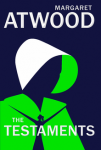Book review The Testaments (This review was in our November 2019 Newsletter)
Finally! The sequel to The Handmaid’s Tale is here! If you’re a Margaret Atwood fan, you’ve likely been anticipating The Testaments for a while. With the Handmaid’s Tale TV show, there is a new group of people who have been captivated by Atwood’s storytelling, and now we have a new novel to keep us all sated. The Testaments picks up fifteen years after The Handmaid’s Tale ends and the dystopian world of Gilead is as patriarchal and evil as ever.. In the novel, there are three protagonists whose testimonies make up the story. There is Agnes Jemima, a young girl from a well to do household—her father is a Commander and they have four Marthas (women who work as maids), which indicate high status in Gilead. Agnes is on track to become a Wife, the highest position a woman can have other than becoming an Aunt (women who dedicate themselves to taking care of women, under the watchful eye of the all-male government). Then we have the written, secret account of Aunt Lydia, one of the founding Aunts—she was there when Gilead was first forming, and was forced to make many difficult choices in order to persevere—in her reflections we see her struggle with the choices she’s made. Aunt Lydia is a very interesting character and her account lets the reader into her innermost thoughts and fears, and plan. Lastly, there’s the testimony from Daisy, a Canadian girl who has grown up learning about Gilead in school, but has more of a connection to Gilead and its people than she realises.
If you typically read for plot, this is not a fast-paced, action-packed story. In Gilead, the Aunts, and all women, find power in secrets and information, power that can be hidden from the Eyes. This novel is highly engaging, especially in terms of character development, and unveiling the inner workings of Gilead. So the action is a little slower If you like dystopian novels, you will definitely enjoy this book, and if you avoid dystopian novels because of the high-school mandated 1984, I would suggest picking up The Testaments for a sharp, poignant look into a society that we could likely see someday. Atwood purposefully designed Gilead entirely from real world instances of control and oppression of women. For instance, women are not allowed to read or write in Gilead, which makes the very action of any woman reader reading this book a revolutionary act. The restrictions on dress code, where women can’t wear pants or “men’s clothing”, or the set duties a woman must carry out according to her station. All things we have seen or are seeing in the world, which makes this an important story to help remind us all that gender equality is the goal and that the (Gileadean) patriarchy needs dismantled.

